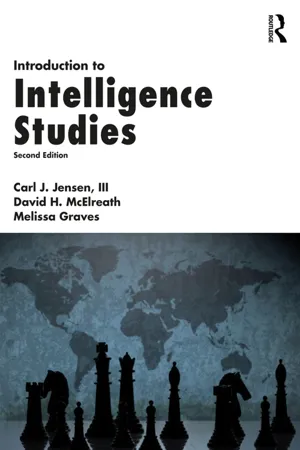
Introduction to Intelligence Studies
- 384 pages
- English
- ePUB (mobile friendly)
- Available on iOS & Android
Introduction to Intelligence Studies
About this book
Introduction to Intelligence Studies provides a comprehensive overview of intelligence and security issues confronting the United States today.
Since the attacks of 9/11, the United States Intelligence Community has undergone an extensive overhaul. This textbook provides a comprehensive overview of intelligence and security issues, defining critical terms and reviewing the history of intelligence as practiced in the United States. Designed in a practical sequence, the book begins with the basics of intelligence, progresses through its history, describes best practices, and explores the way the intelligence community looks and operates today. The authors examine the 'pillars' of the American intelligence system—collection, analysis, counterintelligence, and covert operations—and demonstrate how these work together to provide 'decision advantage'. The book offers equal treatment to the functions of the intelligence world—balancing coverage on intelligence collection, counterintelligence, information management, critical thinking, and decision-making. It also covers such vital issues as laws and ethics, writing and briefing for the intelligence community, and the emerging threats and challenges that intelligence professionals will face in the future. This revised and updated second edition addresses issues such as the growing influence of Russia and China, the emergence of the Islamic State, and the effects the Snowden and Manning leaks have had on the intelligence community.
This book will be essential reading for students of intelligence studies, US national security, and IR in general.
Frequently asked questions
- Essential is ideal for learners and professionals who enjoy exploring a wide range of subjects. Access the Essential Library with 800,000+ trusted titles and best-sellers across business, personal growth, and the humanities. Includes unlimited reading time and Standard Read Aloud voice.
- Complete: Perfect for advanced learners and researchers needing full, unrestricted access. Unlock 1.4M+ books across hundreds of subjects, including academic and specialized titles. The Complete Plan also includes advanced features like Premium Read Aloud and Research Assistant.
Please note we cannot support devices running on iOS 13 and Android 7 or earlier. Learn more about using the app.
Information
Chapter 1
An Overview of Intelligence
Getting Intelligence Right: The Power of Logical Procedure
Chapter Objectives
- Demonstrate familiarity with the many definitions and uses of the term “intelligence.”
- Understand how intelligence enhances national security.
- Summarize the relationship between the intelligence community and policymakers/decision-makers.
- Recognize how the “reality” of intelligence work often differs from common perceptions and myths perpetuated in the popular media.
- Understand the importance of “decision advantage” and how it can be achieved.
- Demonstrate an initial understanding of the delicate balance between intelligence gathering and the rights of citizens.
- List and explain the five functions of intelligence agencies.
Introduction
What Is Intelligence?
- Everyone knows who he is—the phrase “Bond, James Bond” brings instant recognition. In reality, spies need to keep their identities confidential.
- Bond causes a scene everywhere he goes—from car chases to shooting on the run, he wreaks havoc wherever he is. Real spies must remain discreet.
- He has questionable and frequent romantic relationships, often with agents from the other side. In reality, such actions can lead to compromising situations and blackmail.
- While intelligence agencies run on information, Bond never files reports. He seems to do all his talking with his fists.
The Challenge of Defining Intelligence
- Intelligence is a product that consists of information that has been refined to meet the needs of policymakers.
- Intelligence is also a process through which that information is identified, collected, and analyzed.
- Intelligence refers to both the individual organizations that shape raw data into a finished intelligence product for the benefit of decision-makers and the larger community of these organizations.
Information and Intelligence
Table of contents
- Cover
- Title
- Copyright
- Dedication
- Contents
- Acknowledgments
- Authors
- CHAPTER 1 — An Overview of Intelligence
- CHAPTER 2 — History of Intelligence in the United States
- CHAPTER 3 — The IC Today
- CHAPTER 4 — Collection
- CHAPTER 5 — Barriers to Analysis
- CHAPTER 6 — Analytical Methods
- CHAPTER 7 — Putting It All Together: The Intelligence Cycle
- CHAPTER 8 — Counterintelligence
- CHAPTER 9 — Covert Operations
- CHAPTER 10 — Constitutional Mandates—Overview of Executive, Legislative, and Judicial Roles
- CHAPTER 11 — Writing and Briefing for the Intelligence Community
- CHAPTER 12 — Military Intelligence
- CHAPTER 13 — Criminal Intelligence and Crime Analysis
- CHAPTER 14 — Threats and Challenges for the Twenty-First Century
- CHAPTER 15 — Future of Intelligence
- Index